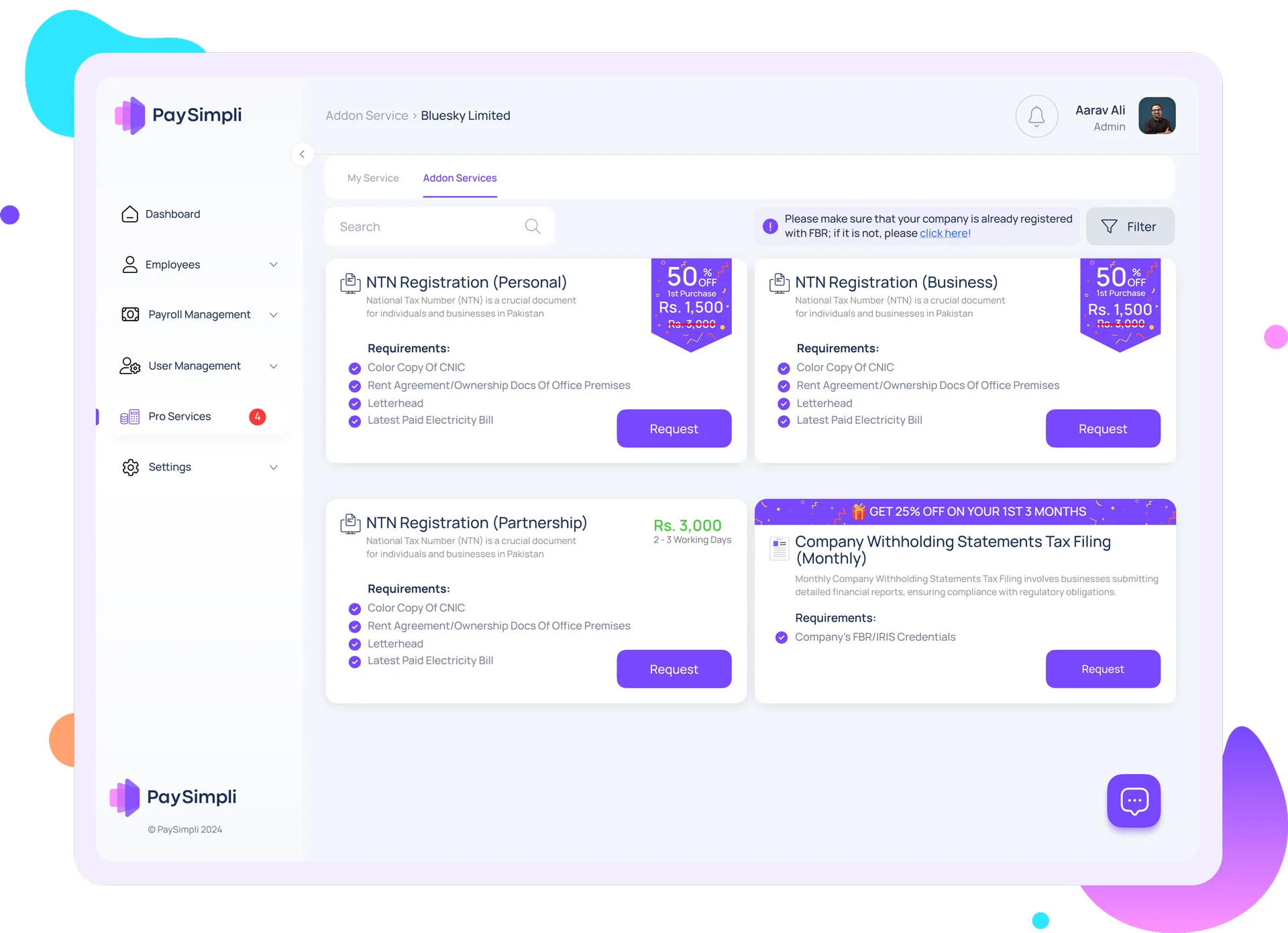With Paysimpli Tax is not Scary!
Income Tax Filing (Business)
Income tax filing for businesses involves the process of reporting and submitting tax returns to the government, detailing the business's income, deductions, credits, and tax liabilities.


Income Tax Filing (Business)
- Color copy of CNIC
- Email address
- Latest paid electricity bill
- 2-3 Working days
- Phone Number
Need help in income tax filing business?
How It Works?
Who needs to file it?
Partnerships, including general, limited, and LLPs, must file income tax returns. Sole proprietors, who run businesses as individuals, report income and expenses on their personal returns. Trusts and estates generating income are also required to file returns.
How can you file it?
Most businesses can file income tax returns electronically via the IRS e-file system or state tax websites. They may use tax preparation software like TurboTax, H&R Block, or TaxAct, or hire tax professionals such as CPAs or tax attorneys to handle the filing.
What is the benefits?
Compliance with tax laws reduces the risk of penalties and legal issues. It helps businesses benefit from deductions, credits, incentives, lowering overall tax liability. Accurate filing offers a clear view of financial health & may be needed for accessing financial services like loans.
Questions About Our Service
Income tax filing for salaried individuals involves declaring annual income to the Federal Board of Revenue (FBR) and calculating payable tax. Returns must be filed by September 30th, including income, expenses, and any applicable deductions or exemptions.
Income tax filing for salaried individuals involves declaring annual income to the Federal Board of Revenue (FBR) and calculating payable tax. Returns must be filed by September 30th, including income, expenses, and any applicable deductions or exemptions.
Income tax filing for salaried individuals involves declaring annual income to the Federal Board of Revenue (FBR) and calculating payable tax. Returns must be filed by September 30th, including income, expenses, and any applicable deductions or exemptions.
Income tax filing for salaried individuals involves declaring annual income to the Federal Board of Revenue (FBR) and calculating payable tax. Returns must be filed by September 30th, including income, expenses, and any applicable deductions or exemptions.
Income tax filing for salaried individuals involves declaring annual income to the Federal Board of Revenue (FBR) and calculating payable tax. Returns must be filed by September 30th, including income, expenses, and any applicable deductions or exemptions.
Reviews of People Who Have Used Our Services
I’ve been using Paysimpli for the past two years, and they’ve never disappointed. The process is quick, and their support team is very professional. They even helped me identify deductions I wasn’t aware of. Great service overall!
Saffa Shuja
As a small business owner, tax filing can be overwhelming. Paysimpli took the stress out of the process and made sure everything was filed accurately and on time. I trust them completely with my tax needs.
Shahzaib Virk
Paysimpli made filing my tax returns incredibly easy. Their platform is user-friendly, and their team was always available to answer my questions. I highly recommend their services to anyone looking for a seamless tax filing experience!
Rana Sufyan Ashfaq
The team at Paysimpli went above and beyond to assist me with my tax returns. They were patient, knowledgeable, and guided me through every step. I felt well taken care of and will definitely use their services again next year.
Sahil Abbas
Filing taxes used to be a chore, but not anymore! Paysimpli's streamlined process and excellent customer service made it a breeze. I appreciate their attention to detail and prompt responses. Highly recommended!
Zain Ali







